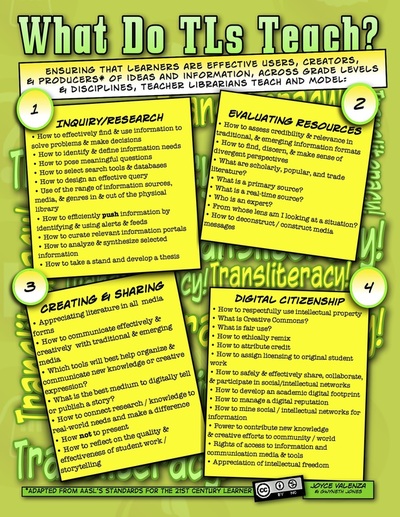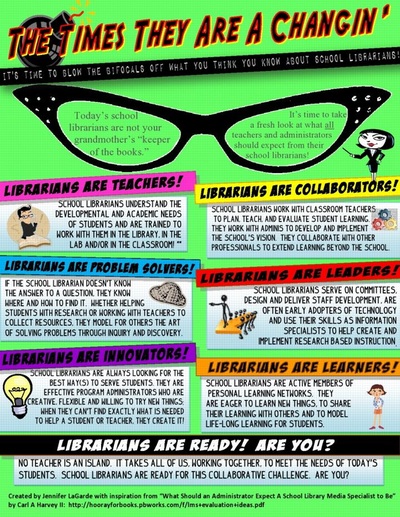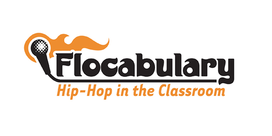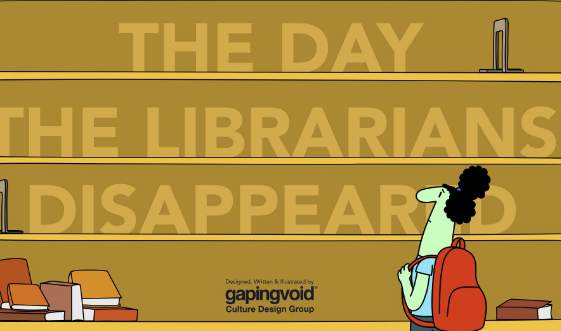Menu
Every Student Deserves a School Library Program!
Article: "Librarians help students navigate an age of misinformation – but schools are cutting their numbers"
- The Conversation, Nov. 5, 2021
- The Conversation, Nov. 5, 2021
Infographics & Fun Stuff
Articles
|
The Unsung Heroes in our Schools
Huffington Post article written by author Brad Meltzer |
|
Why Fund Libraries When It's All Online?
An Awfully Big Blog Adventure blog post |
Research: "6 in 10 Millennials Have 'Low' Technology Skills"
A Great Reason Why Schools NEED Library Media Specialists! |
Community Outreach
|
General Information
To become a Teacher Librarian (School Library Media Specialist) in the state of Ohio, individuals must receive their library endorsement from a local university and obtain an Ohio Teachers License. A passing score on the Praxis II Exam and Library Media Exam is required.
Teacher Librarians are guided by the ALA/AASL Standards for the 21st Century Learner listed at the end of this page.
Teacher Librarians are guided by the ALA/AASL Standards for the 21st Century Learner listed at the end of this page.
Like other teaching professionals, Teacher Librarians adhere to Academic Content Standards. They also promote information literacy and media literacy education.
Teacher Librarians do more than check books in and out to students, they also:
Teacher Librarians do more than check books in and out to students, they also:
- collaborate with teachers, teach lessons, and help locate print and online resources to help reinforce the curriculum
- encourage and promote the love of reading using displays, bulletin boards, readers advisory, lessons, book talks, book fairs, contests, and programming (e.g. author visits, read-a-thons, Family Read Nights, etc.)
- promote independent and lifelong learning by helping students locate and use information effectively both with print and digital materials.
- teach information literacy, technology literacy and media literacy skills
- manage the library collection by evaluating the building's material and digital needs, weeding old materials, and adding new equipment and resources
- manage the library budget
- manage library support staff and volunteers
Teacher Librarians are supported by numerous professional organizations including:
- American Association of School Librarians (AASL)
- American Library Association (ALA)
- Association for Library Service to Children (ALSC)
- Ohio Educational Library Media Association (OELMA)
- Young Adult Library Services Association (YALSA)
"Research shows that school libraries are a stronger indicator of student success than class size, experience of teacher, number of computers, or location of school." Carolyn, Foote. "To Raise Student Achievement, Invest in Libraries." Huffington Post Education 27 Oct. 2010: Huff Post Education. Web. 14 Jan. 2010
Interested in learning more? Check out the following links:
- 2011 School Libraries Count! National Longitudinal Survey of School Library Programs
- Article: Power Up! The New School Library
- My Pinterest Board: Teacher Librarians (SLMS)
- Website: Library Research Service
ALA/AASL Standards for the 21st Century Learner
_Standard 1: Use of Information and Ideas
An effective Library Media Specialist develops engaging instruction that encourages students' ability to think critically, gain and share knowledge, and enhance higher-level inquiry skills. To achieve this goal, one must be knowledgeable of learners and learning, be an effective and knowledgeable teacher, and integrate 21st century skills and learning standards into instruction.
An effective Library Media Specialist develops engaging instruction that encourages students' ability to think critically, gain and share knowledge, and enhance higher-level inquiry skills. To achieve this goal, one must be knowledgeable of learners and learning, be an effective and knowledgeable teacher, and integrate 21st century skills and learning standards into instruction.
_
Standard 2: Teaching and Learning
The Library Media Specialist uses a variety of literacy and instructional strategies when collaborating with teachers to address the diverse interests and needs of learners. Assisting with the development and deliverance of integrated information skills will assist learners in becoming effective users of information as well as encourage reading for pleasure and lifelong learning.
Standard 2: Teaching and Learning
The Library Media Specialist uses a variety of literacy and instructional strategies when collaborating with teachers to address the diverse interests and needs of learners. Assisting with the development and deliverance of integrated information skills will assist learners in becoming effective users of information as well as encourage reading for pleasure and lifelong learning.
_
Standard 3: Collaboration and Leadership
To support the needs of a diverse learning community, effective Library Media Specialists focus on collaboration, leadership, and technology. The Library Media Specialist imparts knowledge on the use of a variety of research strategies while modeling efficient and ethical information-seeking behaviors. The personal and professional growth of self, staff and teachers is encouraged to improve the overall performance and academic achievement of students. One way this can be accomplished is by providing equal access to the virtual, physical, and digital resources in the school media center and by focusing on professional development.
Standard 3: Collaboration and Leadership
To support the needs of a diverse learning community, effective Library Media Specialists focus on collaboration, leadership, and technology. The Library Media Specialist imparts knowledge on the use of a variety of research strategies while modeling efficient and ethical information-seeking behaviors. The personal and professional growth of self, staff and teachers is encouraged to improve the overall performance and academic achievement of students. One way this can be accomplished is by providing equal access to the virtual, physical, and digital resources in the school media center and by focusing on professional development.
_
Standard 4: Program Administration
For the school library media center to be effective, it must operate according to the principles of the library science and administration program. This includes supporting the school mission, effectively managing resources, providing engaging and educational programs, leading professional development activities for other educators, and advocating for the library by articulating ways it contributes to student achievement.
Standard 4: Program Administration
For the school library media center to be effective, it must operate according to the principles of the library science and administration program. This includes supporting the school mission, effectively managing resources, providing engaging and educational programs, leading professional development activities for other educators, and advocating for the library by articulating ways it contributes to student achievement.



